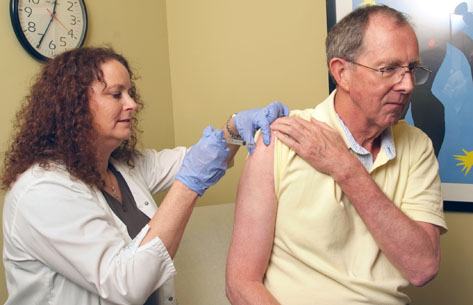More elderly and at-risk adults get their flu and pneumonia vaccinations when the shots are coordinated and given by nurses instead of doctors, a new analysis suggests.
Researchers linked the changeover to a 44-percent increase in patients' chances of getting a flu shot and a more than doubling of their likelihood of getting vaccinated against pneumonia.
Jeffrey Johnson, who worked on the study, said there's been a recent effort to get public health nurses and pharmacists involved in giving vaccines - although policies vary by state in the U.S. He said shifting responsibility to non-doctors might be especially helpful for people with chronic diseases.
"The family physician has all of the responsibility to look after the patient, and so somebody with diabetes, for example, comes in and their first concern is their blood sugar and their blood pressure and pretty soon, the time for the visit is up," Johnson, from the University of Alberta in Edmonton, Canada, told Reuters Health.
"But for a nurse in the primary care setting, (vaccinations and other preventive care) might be the first thing they're responsible for," he added.
"The evidence, we think, clearly shows that shifting the responsibility and the ability to vaccinate to non-physician personnel… That works."
The new analysis is part of research Johnson and his colleagues have been conducting on vaccinations in the elderly and people with chronic diseases - looking at both how effective they are, and how to encourage more people to get them.
His research team analyzed 77 studies of the success of financial incentives, patient outreach and other strategies to improve vaccination rates for flu and pneumonia, in particular.
The U.S. Centers for Disease Control and Prevention recommends all adults and children get the flu shot every year. Adults older than 65 and those with certain chronic conditions are supposed to get the so-called pneumococcal vaccine, as are young kids.
The researchers found that changing who performs vaccinations - especially putting the job in the hands of trained nurses - was one of the most successful vaccination-promoting strategies, along with calls and texts to patients reminding them about the shots.
But even with the team-change strategy, typically less than half of all eligible people got their vaccines, according to findings published in the Annals of Family Medicine.
"In the end, the effectiveness of these things is still pretty modest," Johnson said.
"We need to think of ways to amplify the effect. An obvious one would be to combine the approaches." That could mean making nurses responsible for giving the vaccines and also for reaching out to patients by phone to encourage them to come into the office, he said.
There hasn't been a formal cost analysis of the expense of clearing nurses to give vaccinations, according to Johnson. But in theory, he said, taking up a bit more of a nurse's time should be cheaper than getting doctors to give shots.


0 comments:
Post a Comment